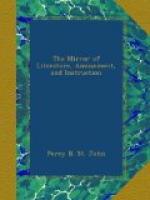* * * * *
MANNERS & CUSTOMS OF ALL NATIONS.
* * * * *
SINGING OF PSALMS.
This has been a very ancient custom both among the Jews and Christians. St. Paul mentions this practice, which has continued in all succeeding ages, with some variations as to mode and circumstance; for so long as immediate inspiration lasted, the preacher, &c. frequently gave out a hymn; and when this ceased, proper portions of scripture were selected, or agreeable hymns thereto composed; but by the council of Laodicea, it was ordered that no private composition should be used in church; the council also ordered that the psalms should no longer be one continued service, but that proper lessons should be interposed to prevent the people being tired. At first the whole congregation bore a part, singing all together; afterwards the manner was altered, and they sung alternately, some repeating one verse, and some another. After the emperors became Christians, and persecution ceased, singing grew much more into use, so that not only in the churches but also in private houses, the ancient music not being quite lost, they diversified into various sorts of harmony, and altered into soft, strong, gay, sad, grave, or passionate, &c. Choice was always made of that which agreed with the majesty and purity of religion, avoiding soft and effeminate airs; in some churches they ordered the psalms to be pronounced with so small an alteration of voice, that it was little more than plain speaking, like the reading of psalms in our cathedrals, &c. at this day; but in process of time, instrumental music was introduced first amongst the Greeks.
Pope Gregory the Great refined upon the church music and made it more exact and harmonious; and that it might be general, he established singing schools at Rome, wherein persons were educated to be sent to the distant churches, and where it has remained ever since; only among the reformed there are various ways of performing, and even in the same church, particularly that of England, in which parish churches differ much from cathedrals; but most dissenters comply with this part of worship in some form or other.
HALBERT H.
* * * * *
SKIMINGTON RIDING.
(To the Editor of the Mirror.)
Having noticed a description of an exhibition called “Skimington Riding,” in the present volume of the MIRROR, and your correspondent being at a loss for the origin of such a title, allow me to observe, that it appears to me that it originated from a skimmer being always used (as I have heard from very good authority it is) as the leading instrument towards making the various sounds usual on such occasions. I think it, therefore, very probable it took its rise from the utensil skimmer, and would be more properly called Skimmerting Riding.




